全国大学生英语竞赛竞赛技巧
全国大学生英语竞赛C类复习整理(超全)

全国大学生英语竞赛C类资料整理Part I听力特别注意:听力内容均是只播放一遍!Section A 5段短对话,分别1个小问题。
Section B 2段长对话,分别5个小问题。
前两部分的长短对话难度其实不是很大,主要是尽快让自己进入状态,听力只有一遍,上一题没听到,就赶紧猜一个,千万不要影响后面的题目。
Section C 5段短新闻,分别1个小问题,内容均是摘自BBC或VOA的新闻。
现在只剩下一个月时间,要大家一直对着BBC或是VOA广播听也不是办法,建议大家上沪江英语学习的BBC或VOA小组,里面的内容一般都是筛选过的,每天听一些,熟悉一下英美人士的发音就好。
Section D 1段长文章,共有10个空格,注意要填写的可能是单词也可能是短语。
最后就是关于考听力的一些提示,毕竟英语竞赛的听力考试是播放录音的,各考场分配到的带子质量不一,考场环境有好有坏。
假设你实在太倒霉了,带子播放不清晰,环境吵杂(监考老师也很可能帮不了你,因为大多监考老师不是英语老师),也不要心慌,冷静下来尽量听到关键词,加上自己的大胆猜测,蒙对的概率也是很大的。
情景词汇大归纳在学校:grade 等级;mark 分数;semester 学期;assignment 作业;lecture 演讲,讲稿;scholarship 奖学金;test 测试;vacation 假期;credit学分;quiz小测验;top student 优等生在医院:medicine 药;injection 注射;diagnose 诊断;prescription 处方;patient 病人;ache 疼痛;stomachache 胃疼,肚子痛;toothache 牙痛;headache 头痛;high fever 发高烧;sore throat 嗓子痛;mumps 腮腺炎;measles 麻疹;lung cancer 肺癌;liver cancer 肝癌;heart attack 心脏病发作;physician 内科医生;surgeon 外科医生;pediatrician 儿科医生;vet 兽医;recovery (from) (病后)痊愈,恢复;operation 手术; doctor 医生;nurse 护士;ward 病房;emergency-ward 急诊病房;cough 咳嗽; temperature 体温;blood pressure 血压;在宾馆: reception desk 接待处;front desk 前台;vacant room 空房;single room 单人间;double room双人间;reserve/book 预定;check in 登记住入;check out 结帐离开;porter 行李搬运工;tip 小费;full 客满;room service 房间服务部,服务到屋在商店:bargain 便宜货;receipt 收据;cashier 出纳;shop assistant 售货员;salesclerk 店员;fake commodities 假冒伪劣商品;size 尺寸;color 颜色;style 式样; price 价格;guarantee 保修; expiration period 保质期;after-sale service售后服务;fashion 时髦,时尚;cheap 便宜的;expensive 昂贵的;counter 柜台在机场:flight 航班;passport 护照;visa 签证;board 登机;reservation 预约;airhostess 空中小姐;pilot 飞行员;duty-free shop 免税店;airport 机场在餐馆:waiter 服务员;waitress 女服务员;order 点菜;menu 菜单;bill 帐单;drink 饮料;soft drink 不含酒精的饮料;salad 色拉;soup 汤;dessert 甜点;roast beef 烤牛肉;pork 猪肉;mutton 羊肉;lamb 羔羊肉;chicken 鸡肉;fish 鱼肉;steak 牛排;go Dutch 各付各的,AA制;on the house 免费;It is my treat (it’s on me)我请客在法院:sue 控告;legal 合法的;accuse 控告;the accused /defendant 被告;the plaintiff /accuser 原告;charge 控诉;convict 宣告有罪;client 委托人,当事人;judge 法官;sentence 判刑;imprisonment 关押,监禁;capital punishment 死罪;death penalty 死刑在邮局:postage 邮资;letter 信件;postcard 明信片;stamp 邮票;envelope 信封;parcel 包裹;registered mail 挂号信;air mail 航空邮件;ordinary mail 普通邮件;express mail 快件;telegram 电报;money order 汇款在银行:current/checking account 活期帐户;deposit account 定期帐户;savings account 储蓄帐户;balance 余额;check 支票;bank clerk 银行职员;interest rate 利率;cash 现金;dollar 美圆;pound 英镑;open an account 开户;withdraw some money 取出一些钱和旅行有关的词汇:package tour 由旅行社承包一切的旅行;travel agent 旅行代理人,旅行代办人;travel agency 旅行社;travel map 旅游图;traveler’s check 旅行支票;brochure 小册子;place of (historical) interest 历史名胜;seaside resort海边度假胜地和体育有关的词汇:gymnastics 体操;high jump 跳高;long--jump跳远;discus铁饼;shot put 铅球;aerobics健美操;power walking竞走;figure skating花样滑冰;surfing冲浪;jogging慢跑;canoeing划船;fencing击剑;judo柔道;cricket板球;roller skating旱冰;weight –lifting 举重;rowing赛船;badminton羽毛球;sumo(-wrestling) 相扑与新闻相关的词汇Negotiations谈判, delegate代表 , delegation代表(团), summit 峰会 , declaration 宣布sponsor发起者(倡议者), resolve their differences 消除分歧, promote peace 促进和平, boost economic co-op加强经济合作make concession/compromise作出妥协,pass a resolution通过决议veto a bill否决议案break the deadlock打破僵局a scientific breakthrough科学突破an unexpected outcome出乎意料的结果sign/ratify an accord/deal/treaty/pact/agreement 签署协议diplomatically isolated country在外交上被孤立的国家diplomatic solutions外交解决方案military option军事解决途径(动用武力)escalating tension逐步升级的局势military coupe军事政变forced from office被赶下台step down/aside下台on the brink of war处于战争边缘hot spot热点,take hostilities toward..对..采取敌对态度sporadic fighting断断续续的战斗rebels 叛军wounded, killed, injury, death, casualties伤亡heavy fighting激战 , genocide种族灭绝relief effort救济工作humanitarian aid人道主义援助ethnic cleansing种族排斥broker/mediate a ceasefire/truce促成停火refugee 难民illegal aliens非法移民mediator调解员end the bloodshed结束流血事件special envoy特使peace-keeping forces维和部队 national convention国民大会guerrilla war游击战争,border dispute边境争端 armed conflict武装冲突reconciliation调解fight corruption反腐败corrupted election腐败的选举peace process和平进程 give a boost to...促进 booming economy促进经济发展civil war内战 mutual benefits/interests双赢cruise missile 巡航导弹come to a conclusion达成一致coalition forces联合军队interim/transitional government过渡政府sluggish economy萧条的经济on high alert 处于高级戒备状态rebellion叛乱 rebel forces叛军Defense Minister国防部长 evacuate疏散Pentagon五角大楼impose/break a deadline规定/打破最后期限retaliate报复banking reform金融改革commissioner代表go bankrupt破产file for bankruptcy提出破产deputy代表sensitive敏感 hostage人质 kidnapped French nationals被绑架的法国人rescue救援 release释放invade入侵US-led invasion美国领导的入侵right-wing extremists右翼极端分子external forces外部力量warring factions交战各方topple the government推翻政府disarmament agreement裁军协议mandate 托管,命令boycott 抵制embargo 禁运,禁止通商impose sanctions against...实施制裁dismantle销毁the implementation of an accord执行决议germ warfare介子战争to ease the ban on ivory trade缓解对象牙贸易的禁令to harbor sb.保护animal conservation动物保护threatened/endangered species濒危物种illegal poaching非法捕猎face extinction濒临灭亡stagnant/ recession 萧条financial crisis金融危机deflation通货紧缩inflation通货膨胀 retail prices零售价格whole sale prices批发价格suicide bombing自杀性袭击事件dispute纠纷 crisis危机 conflict冲突 holy war圣战administration管理 regime制度claim responsibility for...声称负责suspend停止resume继续 ,Gallup/opinion/exit poll, survey民意调查provocation挑衅,rule out the possibility of...排除可能性stand trial受审put ....on trial审判某人sue,file suit against...状告radioactive放射性 radiation辐射uranium enrichment program铀浓缩计划suspect, arrest, detain, in custody被囚禁on human rights abuse charges反人权罪名HIV positive HIV阳性malaria, diabetes, hypertension,lung cancer, breast cancer疟疾,糖尿病,高血压,肺癌,乳腺癌fight poverty/starvation/hunger/disease/virus 抗击贫困,饥饿,疾病,病毒stop the spread of...停止传播…crack down on...严打illegal drug trafficking毒品贩运piracy, pirated products盗版产品fake goods假货notorious臭名昭著 bloody tyrant血腥独裁者,execute/execution处决 death penalty死刑seminar研讨小组 forum论坛peace conference 和会 national convention全国代表大会his counterpart同等级别的人my predecessor/successor我的前任/后任coalition party联合政党post-war reconstruction战后重建pre-war intelligence战前情报radar雷达 espionage间谍spying activity间谍行为,electronic warfare电子战争chemical/biological/nuclear warfare化学/生物/核战争Part II词汇和结构一共15小题,考的语法知识不是太难,四六级之间的程度。
C类—IQ题型讲义(已基本整理好,仅供参考)

全国大学生英语竞赛C类应试辅导——IQ Test一、题型分析二、解题技巧三、技巧练习四、复习指南一、题型分析(一) 考核要求这类试题主要考查考生的逻辑推理、数字运算、常识判断及灵活应变的思维能力。
由于试题以英文出现,所以同时也考查考生的英文水平。
(二) 试题结构5道小题,以问答或填空形式出题,其中部分试题配有图片。
注意:客观题主观题 (2008年以前为multiple choice客观题型,2008年样题改为填空形式的主观题,没有选项可供选择)(三) 试题特点1. 区别于国内其他英语考试的特有题型,与国际英语考试GRE和GMAT中的数学题和逻辑题有相似之处;2. 可归纳为数字题(Mathematical Questions)、逻辑题(Logical Questions)及语言题(Linguistic Questions)等三类;如:One half of one quarter of one tenth of 800 is ________.(2008年C 类样题)——数字题You are competing in a race and overtake the runner in second place. What position are you in now? (2008年B类样题)——逻辑题Only one other word can be made from all the letters of INSATIBLE. What is it? (2008年A类样题)——语言题3. 分值不高,时间较紧(5分钟完成5道题)。
(这类试题也是很多英语学习爱好者很感兴趣的;做得好,能从中获得乐趣。
同时这部分题也是高水平学生拔高,拉出差距的地方。
)二、解题技巧耐心研读试题,明确题目意思和题目所要考查的目标,找出题中隐含的规律,然后进行推导得出答案。
(一) 数学题首先是准确地理解题目要求,然后通讨加、减、乘、除等运算找出数字之间的关系,最后对答案加以验证。
全国大学生英语竞赛指南

全国大学生英语竞赛指南The National College English Competition is a prestigious event that showcases the linguistic prowess of students across the country. As an aspiring participant, it is crucial to understand the intricacies of this competition and prepare accordingly. In this guide, we will delve into the key aspects of the competition, providing you with the necessary insights to maximize your chances of success.Firstly, it is essential to familiarize yourself with the competition format. The National College English Competition typically consists of several stages, each designed to assess your proficiency in various aspects of the English language. The preliminary round may involve a written examination testing your grammar, vocabulary, and reading comprehension. Successful candidates then advance to the next stage, which could include a listening comprehension test and an oral presentation.One of the keys to excelling in the competition is to develop a well-rounded set of English language skills. While possessing a strong command of grammar and vocabulary is undoubtedly important, it isequally crucial to focus on improving your listening, speaking, and writing abilities. Engage in regular practice sessions, listen to English audio materials, and participate in discussions or debates to enhance your fluency and confidence.When it comes to the written examination, it is essential to familiarize yourself with the test format and the types of questions you may encounter. Practice solving sample tests and pay close attention to the scoring criteria to understand the examiners' expectations. Develop strategies for efficiently managing your time and ensuring that your responses are well-structured and coherent.The oral presentation component of the competition is often a significant challenge for many participants. To excel in this aspect, it is crucial to develop strong public speaking skills. Practice delivering presentations on a variety of topics, focusing on clear articulation, effective use of body language, and the ability to engage your audience. Additionally, be prepared to respond to questions from the judges with confidence and clarity.Another crucial aspect of the National College English Competition is the ability to demonstrate a deep understanding of English language and culture. Familiarize yourself with current events, literature, and cultural traditions of English-speaking countries. This knowledge can be leveraged in the written examination, as well as the oralpresentation, to showcase your well-rounded linguistic and cultural competence.Effective time management is also key to success in the National College English Competition. Develop a structured study plan that allows you to allocate time for each aspect of the competition, including language skill development, practice tests, and mock presentations. Ensure that you are well-rested and focused on the day of the competition, as this can significantly impact your performance.Finally, it is important to maintain a positive and confident mindset throughout the competition. Believe in your abilities and trust in the hard work you have put in. Approach each stage of the competition with a calm and focused demeanor, and be prepared to learn from your experiences, regardless of the outcome.In conclusion, the National College English Competition is a challenging yet rewarding experience that can open doors to new opportunities. By understanding the competition format, developing a comprehensive set of English language skills, and maintaining a positive and focused mindset, you can position yourself for success. Embrace the journey, learn from the process, and strive to showcase your linguistic prowess on the national stage.。
英语竞赛之翻译篇(一)
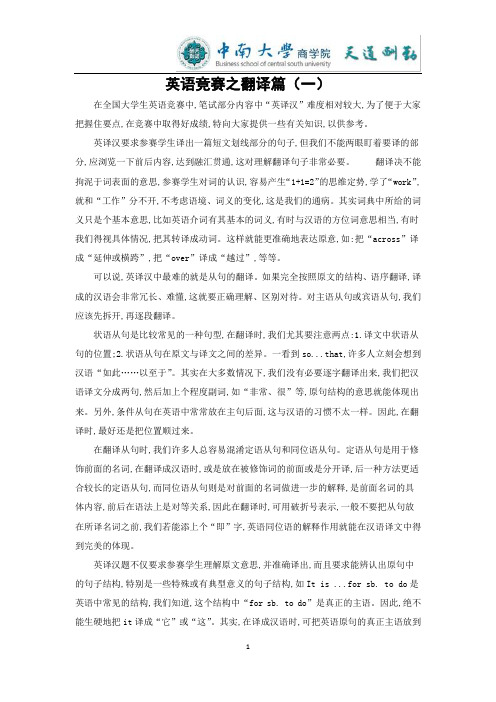
英语竞赛之翻译篇(一)在全国大学生英语竞赛中,笔试部分内容中“英译汉”难度相对较大,为了便于大家把握住要点,在竞赛中取得好成绩,特向大家提供一些有关知识,以供参考。
英译汉要求参赛学生译出一篇短文划线部分的句子,但我们不能两眼盯着要译的部分,应浏览一下前后内容,达到融汇贯通,这对理解翻译句子非常必要。
翻译决不能拘泥于词表面的意思,参赛学生对词的认识,容易产生“1+1=2”的思维定势,学了“work”,就和“工作”分不开,不考虑语境、词义的变化,这是我们的通病。
其实词典中所给的词义只是个基本意思,比如英语介词有其基本的词义,有时与汉语的方位词意思相当,有时我们得视具体情况,把其转译成动词。
这样就能更准确地表达原意,如:把“across”译成“延伸或横跨”,把“over”译成“越过”,等等。
可以说,英译汉中最难的就是从句的翻译。
如果完全按照原文的结构、语序翻译,译成的汉语会非常冗长、难懂,这就要正确理解、区别对待。
对主语从句或宾语从句,我们应该先拆开,再逐段翻译。
状语从句是比较常见的一种句型,在翻译时,我们尤其要注意两点:1.译文中状语从句的位置;2.状语从句在原文与译文之间的差异。
一看到so...that,许多人立刻会想到汉语“如此……以至于”。
其实在大多数情况下,我们没有必要逐字翻译出来,我们把汉语译文分成两句,然后加上个程度副词,如“非常、很”等,原句结构的意思就能体现出来。
另外,条件从句在英语中常常放在主句后面,这与汉语的习惯不太一样。
因此,在翻译时,最好还是把位置顺过来。
在翻译从句时,我们许多人总容易混淆定语从句和同位语从句。
定语从句是用于修饰前面的名词,在翻译成汉语时,或是放在被修饰词的前面或是分开译,后一种方法更适合较长的定语从句,而同位语从句则是对前面的名词做进一步的解释,是前面名词的具体内容,前后在语法上是对等关系,因此在翻译时,可用破折号表示,一般不要把从句放在所译名词之前,我们若能添上个“即”字,英语同位语的解释作用就能在汉语译文中得到完美的体现。
全国大学生英语竞赛
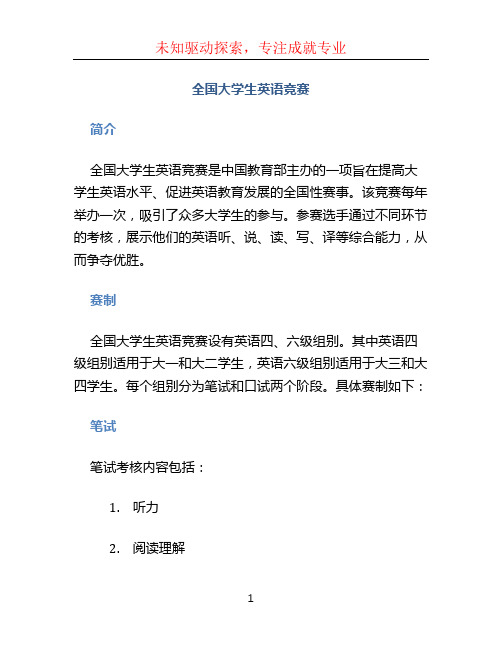
全国大学生英语竞赛简介全国大学生英语竞赛是中国教育部主办的一项旨在提高大学生英语水平、促进英语教育发展的全国性赛事。
该竞赛每年举办一次,吸引了众多大学生的参与。
参赛选手通过不同环节的考核,展示他们的英语听、说、读、写、译等综合能力,从而争夺优胜。
赛制全国大学生英语竞赛设有英语四、六级组别。
其中英语四级组别适用于大一和大二学生,英语六级组别适用于大三和大四学生。
每个组别分为笔试和口试两个阶段。
具体赛制如下:笔试笔试考核内容包括:1.听力2.阅读理解3.完型填空4.作文笔试考试时间通常为两个小时,共计满分为150分。
口试口试考核内容包括:1.英语口语技能2.英语面试技巧3.英语口头表达能力口试考试时间通常为10-15分钟。
决赛在初赛后,每个组别将选拔出一定数量的选手进入决赛。
决赛的内容包括:1.演讲2.辩论3.翻译4.团队合作项目决赛的评委由英语教育专家和相关领域的专业人士组成。
参赛资格全国各高等院校的在校本科生均可以参加全国大学生英语竞赛。
每个学校设有选拔赛,选拔赛的成绩决定了参赛资格。
一般来说,参赛者需具备下列条件:1.具备一定的英语基础知识;2.对英语学习有浓厚的兴趣;3.具备良好的英语口语表达能力;4.具备良好的英语写作能力。
奖项设置全国大学生英语竞赛根据成绩给予参赛选手不同的奖项和荣誉称号。
一般设有以下奖项:1.一等奖2.二等奖3.三等奖4.最佳风采奖5.最佳创意奖6.最佳团队奖此外,竞赛还会为优秀的指导教师和学校颁发相应荣誉。
影响全国大学生英语竞赛不仅是一项英语能力考核活动,也是促进我国大学英语教育的重要推动力。
通过参与竞赛,学生们在提升英语能力的同时,也得到了更多的学习机会和交流平台。
该竞赛还促使各高校英语教师提高教学质量,加强教学改革。
此外,全国大学生英语竞赛也为参赛选手提供了与全国各地优秀学生交流的机会,扩大了学生的视野,提高了综合素质,对提升学生的职业竞争力起到了积极的作用。
结语全国大学生英语竞赛是一项重要的英语教育活动,为大学生提供了提高英语水平和发展综合能力的机会。
大学生英语竞赛(C类)词汇与结构部分
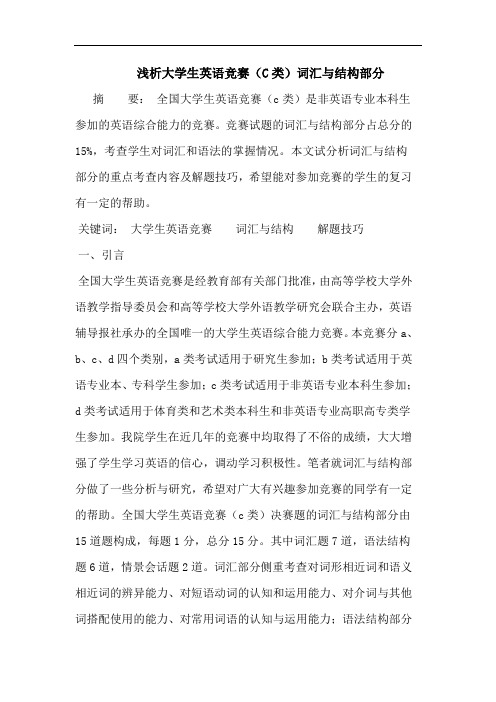
浅析大学生英语竞赛(C类)词汇与结构部分摘要:全国大学生英语竞赛(c类)是非英语专业本科生参加的英语综合能力的竞赛。
竞赛试题的词汇与结构部分占总分的15%,考查学生对词汇和语法的掌握情况。
本文试分析词汇与结构部分的重点考查内容及解题技巧,希望能对参加竞赛的学生的复习有一定的帮助。
关键词:大学生英语竞赛词汇与结构解题技巧一、引言全国大学生英语竞赛是经教育部有关部门批准,由高等学校大学外语教学指导委员会和高等学校大学外语教学研究会联合主办,英语辅导报社承办的全国唯一的大学生英语综合能力竞赛。
本竞赛分a、b、c、d四个类别,a类考试适用于研究生参加;b类考试适用于英语专业本、专科学生参加;c类考试适用于非英语专业本科生参加;d类考试适用于体育类和艺术类本科生和非英语专业高职高专类学生参加。
我院学生在近几年的竞赛中均取得了不俗的成绩,大大增强了学生学习英语的信心,调动学习积极性。
笔者就词汇与结构部分做了一些分析与研究,希望对广大有兴趣参加竞赛的同学有一定的帮助。
全国大学生英语竞赛(c类)决赛题的词汇与结构部分由15道题构成,每题1分,总分15分。
其中词汇题7道,语法结构题6道,情景会话题2道。
词汇部分侧重考查对词形相近词和语义相近词的辨异能力、对短语动词的认知和运用能力、对介词与其他词搭配使用的能力、对常用词语的认知与运用能力;语法结构部分考查学生对基本语法知识的掌握与运用;情景会话题考查学生的口语能力,即在具体的语言环境中怎样应答得体。
二、重点考查内容1.词汇部分单词词义辨析题考查词汇量,这类考题旨在考查考生的词汇量及运用所学词汇准确理解具体问题的能力。
选项之间不存在形式和内容上的共性,考生只能通过题干、上下文来确定相关的意义选择。
近义词辨析题依据题干的逻辑意义和单词的不同内涵确定,近义词辨析题是考生最感头痛的方面。
由于两个或两个以上的选项含有相同或相近的意思,考生很难决定哪一个选项是正确答案。
其实,在英语中一词多义的现象很常见,有时题目考查的重点就在于某一选项的其它含义,而非与其他三个选项相近的含义。
全国大学生英语竞赛 a类研究生应试指南
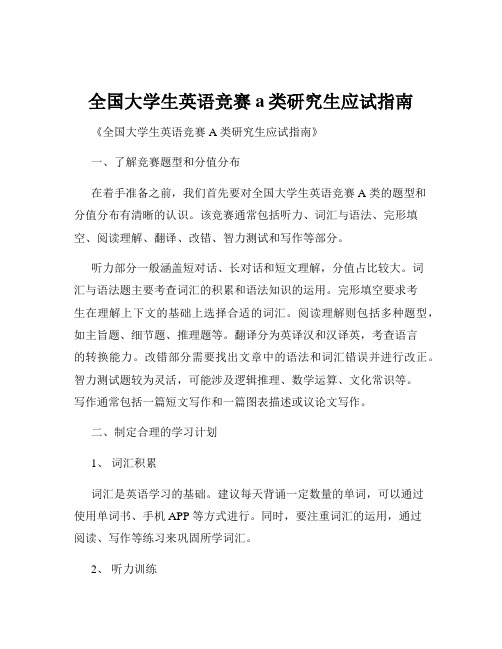
全国大学生英语竞赛 a类研究生应试指南《全国大学生英语竞赛 A 类研究生应试指南》一、了解竞赛题型和分值分布在着手准备之前,我们首先要对全国大学生英语竞赛 A 类的题型和分值分布有清晰的认识。
该竞赛通常包括听力、词汇与语法、完形填空、阅读理解、翻译、改错、智力测试和写作等部分。
听力部分一般涵盖短对话、长对话和短文理解,分值占比较大。
词汇与语法题主要考查词汇的积累和语法知识的运用。
完形填空要求考生在理解上下文的基础上选择合适的词汇。
阅读理解则包括多种题型,如主旨题、细节题、推理题等。
翻译分为英译汉和汉译英,考查语言的转换能力。
改错部分需要找出文章中的语法和词汇错误并进行改正。
智力测试题较为灵活,可能涉及逻辑推理、数学运算、文化常识等。
写作通常包括一篇短文写作和一篇图表描述或议论文写作。
二、制定合理的学习计划1、词汇积累词汇是英语学习的基础。
建议每天背诵一定数量的单词,可以通过使用单词书、手机 APP 等方式进行。
同时,要注重词汇的运用,通过阅读、写作等练习来巩固所学词汇。
2、听力训练每天进行听力练习,可以选择听英语新闻、电影、电视剧或者专门的听力材料。
在听的过程中,要注意捕捉关键信息,提高听力理解能力。
3、阅读训练广泛阅读各类英语文章,包括学术论文、新闻报道、文学作品等。
通过阅读,提高阅读速度和理解能力,同时积累词汇和语法知识。
4、写作练习定期进行写作训练,尝试不同类型的作文题目。
写完后,可以请老师或同学帮忙批改,注意语法错误和逻辑结构。
5、模拟考试按照考试时间和要求进行模拟考试,熟悉考试流程和节奏,提高答题速度和应试能力。
三、各题型的应对策略1、听力在听力考试前,要快速浏览选项,预测听力内容。
听的过程中,要集中注意力,抓住关键词和关键句。
对于没听懂的部分,不要纠结,继续往下听。
2、词汇与语法平时要注重积累常见的词汇和语法点,通过做练习题来巩固。
在考试中,如果遇到不确定的题目,可以通过排除法来选择答案。
大英赛知识点
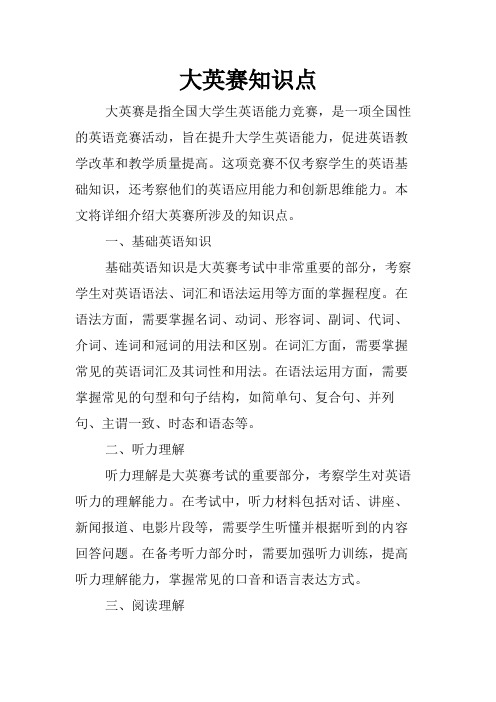
大英赛知识点大英赛是指全国大学生英语能力竞赛,是一项全国性的英语竞赛活动,旨在提升大学生英语能力,促进英语教学改革和教学质量提高。
这项竞赛不仅考察学生的英语基础知识,还考察他们的英语应用能力和创新思维能力。
本文将详细介绍大英赛所涉及的知识点。
一、基础英语知识基础英语知识是大英赛考试中非常重要的部分,考察学生对英语语法、词汇和语法运用等方面的掌握程度。
在语法方面,需要掌握名词、动词、形容词、副词、代词、介词、连词和冠词的用法和区别。
在词汇方面,需要掌握常见的英语词汇及其词性和用法。
在语法运用方面,需要掌握常见的句型和句子结构,如简单句、复合句、并列句、主谓一致、时态和语态等。
二、听力理解听力理解是大英赛考试的重要部分,考察学生对英语听力的理解能力。
在考试中,听力材料包括对话、讲座、新闻报道、电影片段等,需要学生听懂并根据听到的内容回答问题。
在备考听力部分时,需要加强听力训练,提高听力理解能力,掌握常见的口音和语言表达方式。
三、阅读理解阅读理解是大英赛考试的另一个重要部分,考察学生对英语阅读的理解能力。
在考试中,阅读材料包括新闻报道、专业文章、小说等,需要学生阅读并根据阅读内容回答问题。
在备考阅读部分时,需要加强阅读训练,提高阅读理解能力,掌握常见的阅读策略和技巧。
四、写作能力写作能力是大英赛考试的重要组成部分,考察学生的英语写作能力。
在考试中,写作题目一般包括议论文、作文、翻译等,需要学生在规定时间内完成。
在备考写作部分时,需要多进行写作训练,提高写作水平,掌握常见的写作技巧和方法。
五、口语表达口语表达是大英赛考试的重要部分,考察学生的英语口语表达能力。
在考试中,口语表达包括口语考试、演讲、辩论等,需要学生在规定时间内完成。
在备考口语部分时,需要多进行口语训练,提高口语表达能力,掌握常见的口语技巧和方法。
六、跨文化交际跨文化交际是大英赛考试的另一个重要部分,考察学生在跨文化交际方面的能力。
在考试中,需要学生了解并掌握不同文化之间的差异,了解和尊重不同文化的习惯和做法。
全国大学生英语竞赛指南

全国大学生英语竞赛指南English:The National College English Competition is an annual event held for university students across the country to showcase their English language skills in various categories such as speaking, writing, listening, and reading. This competition not only provides a platform for students to demonstrate their proficiency in English but also encourages them to improve their language abilities through preparation and participation. Participants can expect to be challenged with tasks that test their grammar, vocabulary, comprehension, and critical thinking skills. In addition to the competitive aspect, the competition also fosters camaraderie among students who share a passion for learning English. Winners of the competition receive recognition for their hard work and dedication to mastering the English language, as well as valuable prizes and opportunities for further academic and career development. By participating in the National College English Competition, students can enhance their language proficiency, gain confidence in their abilities, and expand their knowledge and understanding of the English language and culture.中文翻译:全国大学生英语竞赛是一年一度的活动,旨在为全国各大学生展示他们在口语、写作、听力和阅读等各个领域的英语语言技能。
全国大学生英语竞赛(B类)初赛赛前备考及应试技巧

业集训 小组进行强化训练 的重要性做 了说 明, 阐述 了参赛过程 中的应试技 巧以及如何在考试 中合理分配时间 【 关键词l大学生英语竞赛 试题分析 赛前 备考 应试技巧
全 国 大 学 生 英 语 竞 赛 作 为 高 等 学 校 大 学 外 语 教 学 指 导 委 员 会 和 高 等 去 不 应 丢 的 分 数 。 在看 不 到 以上 代 表 性 词 语 的题 干 中 , 应 着 重 关 注 主 语 和 学 校 大 学 外 语 教 学 研 究会 组 织 的全 国 唯 一 一 个 考 察 大 学 生 英 语 综 合 能 力 动 词 , 这 样 在 放 录音 时 能够 清 晰 准 确 地 抓 住 相 关项 j 的竞 赛 活 动 , 每 年 吸 引 着 无 数 高校 学 子参 与 其 中 。 不 少 英 语 专 业 的 学 生 也 踊跃参赛 , 希 望 通 过 这 个在 全 国有 影 响 力 的 比 赛 获 得 对 自 己英 语 能 力 的 肯 3 . 阅 读 理 解 的 重要 地 位 及 赛 前 备 考
謦 潭 静 蔫
全国大学生英语竞赛 ( B 类) 初赛赛前备考及应试技巧
◆乐 力 葛 瑞 红
( 湖4 k . Dl k 火 学 外 围 学 院 )
【 摘要 】以湖 北工 业 大 学 外 国语 学 院英 语 系专 业 集训 小组 参 加 2 0 1 3年 全 N 大 学 生 英 语 竞 赛 ( B类 ) 初 赛 的 经 历 为基 础 , 对 全 国 大 学 生 英 语竞赛( B类 ) 初 赛 试 题进 行 了详 细 分析 , 总 结 出 了试 题 中 占权 重 比较 大的 题 目并针 对每 个题 目 提 出合理 的 赛前 备 考 建议 , 对 褥 前 戍 立 专
( B类 ) 。赛 后各个成员获得了不错成绩并进行 了赛后经验 总结 , 归纳 出初 竞 赛 中提 取 的 阅 读 材料 难 度 不 大 , 生僻词汇较 少 , 文章篇幅适 中, 文体 大 都 赛 中重点题型准备 以及系列应试技巧 , 旨在 帮助 日后更 多参赛 的英语专业 为易 于 理 解 的 叙 述 文 或议 论 文 , 因此 难 度 就 全 集 中 在 如 何 在 短 时 间 内 正 确 选 手 在 比赛 中创 得 佳 绩 . 收获成功。 定位答案。大部分考生习惯先 阅读全文并掌 握文章大意后再 看题 目, 但此
全国大学生英语竞赛复习资料

全国大学生英语竞赛复习资料全国大学生英语竞赛复习资料全国大学生英语竞赛是我国高校中备受瞩目的一项活动,它不仅是对学生英语水平的一次全面检验,也是展示学生才华和能力的机会。
参加这项竞赛需要学生具备扎实的英语基础和广泛的知识面。
为了帮助广大学生备战这一重要考试,本文将提供一些复习资料和备考建议。
首先,对于英语竞赛的复习,我们应该从基础知识入手。
英语的基础知识包括词汇、语法和阅读理解。
在词汇方面,我们可以通过背单词的方式来扩充词汇量。
可以使用各种背单词软件或者制定自己的背诵计划,每天坚持背诵一定数量的单词,并进行复习。
此外,还可以通过阅读英语文章来积累词汇,通过上下文推测词义,加深记忆。
在语法方面,我们可以通过学习语法规则和做相关的练习题来提高语法水平。
可以参考一些经典的语法书籍,如《英语语法大全》等。
阅读理解是英语竞赛中的重点考察内容,我们可以通过阅读英文报纸、杂志、小说等来提高阅读理解能力。
在阅读的过程中,要注意理解文章的主旨,抓住关键信息,提高阅读速度和准确性。
其次,英语竞赛还会考察学生的听力和口语能力。
对于听力方面,我们可以通过听英语广播、英语电台、英语歌曲等来提高听力水平。
可以选择一些听力练习材料进行听写和模仿。
同时,还可以参加一些英语角、英语沙龙等活动,与其他学习英语的同学进行交流和练习。
口语方面,可以通过模拟口语考试的形式进行练习。
可以选择一些口语练习题,进行自我表达和讨论。
还可以找一个英语学习伙伴,互相进行口语练习,提高口语表达能力。
此外,为了更好地备战英语竞赛,我们还可以参考一些辅助资料。
可以选择一些备考指南或者教材,这些资料通常会提供一些复习的重点和技巧。
可以选择一些历年的竞赛试题进行练习,以了解竞赛的考试形式和题型。
还可以参加一些英语竞赛培训班或者线上课程,这些培训班通常会有专业的老师进行指导,提供一些备考建议和技巧。
最后,备战英语竞赛需要坚持和持之以恒。
复习英语不是一蹴而就的事情,需要长期的积累和练习。
大学生英语竞赛简答题的应试技巧

能力结合在一起的测试。因此,在做题时可以把题目看作是变相的阅读理解试题。通 读全文时不妨动用阅读理解技巧,例如:抓住语篇大意、把握作者思路、综合推理判断、 根据语境推测词义等。
在具体步骤上可以先用略读法(skimming)快速扫视全文,了解大意,然后再看文章 后的问题,以明确具体要求,根据提问进行查读(scanning)和细读,边读边做题。还有 一种方法是先看考题,后阅读,再做题。这样做在阅读时或许更有针对性。
在补足不完整的句子时,应在弄清题干要求后,依照有关线索,快速查找涉及不完整 句子的关键词和相关内容。
3留心词句的深层含义
在回答特定词或句子含义时,要注意超出字面意义的深层含义,尤其是该词在文章特 定语境中的意思。
品黄黑 MYK 4用关键词、句归纳总结 回答涉及中心思想、篇章结构方面的题目时,应该在通读原文后用关键词、句进行归 纳总结,尽量用简洁英语叙述清楚。 答题注意事项 根据简答题的评分原则与标准,应注意以下事项:
1一定要用最简洁的英语(in the fewest possible words)回答问题。有的试题规定: 答题尽量简短,超过 10 个词要扣分。
2问什么,答什么,注意答出问题的全部内容,但不要答无关内容。答了无关内容 要扣分。另外,还要注意,答题中不要有相互矛盾的内容,内容矛盾的部分不能得分。
3注意语言正确,语言错误要扣分,无关内容出现语言错误也同样要扣分。 4切忌照抄原文,按评分标准,照搬一句扣 05 分,照搬两句或两句以上就不得分 了。
回答问题时一定要注意单词拼写无误、句子语法正确、内容得太多时间,一时感觉棘手的题目可以放在后面 集中精力加以解决。要以原文内容为依据决定欲表达的意思,务必按规定的字数用简明的 词语或短句写出答案,同时应注意字迹清晰、卷面整洁。
全国英语大学生竞赛2篇
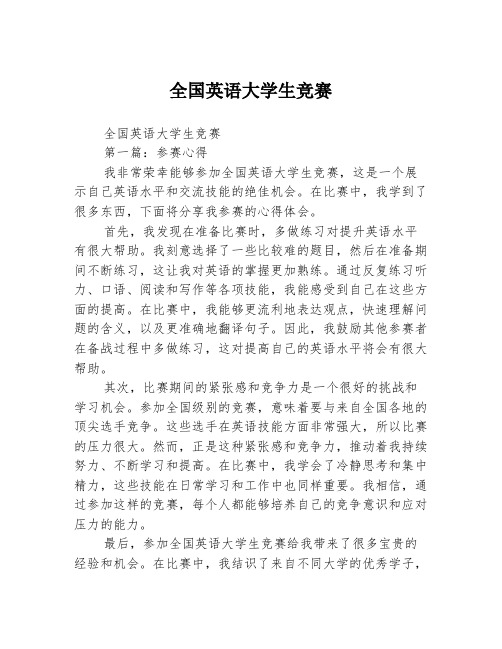
全国英语大学生竞赛全国英语大学生竞赛第一篇:参赛心得我非常荣幸能够参加全国英语大学生竞赛,这是一个展示自己英语水平和交流技能的绝佳机会。
在比赛中,我学到了很多东西,下面将分享我参赛的心得体会。
首先,我发现在准备比赛时,多做练习对提升英语水平有很大帮助。
我刻意选择了一些比较难的题目,然后在准备期间不断练习,这让我对英语的掌握更加熟练。
通过反复练习听力、口语、阅读和写作等各项技能,我能感受到自己在这些方面的提高。
在比赛中,我能够更流利地表达观点,快速理解问题的含义,以及更准确地翻译句子。
因此,我鼓励其他参赛者在备战过程中多做练习,这对提高自己的英语水平将会有很大帮助。
其次,比赛期间的紧张感和竞争力是一个很好的挑战和学习机会。
参加全国级别的竞赛,意味着要与来自全国各地的顶尖选手竞争。
这些选手在英语技能方面非常强大,所以比赛的压力很大。
然而,正是这种紧张感和竞争力,推动着我持续努力、不断学习和提高。
在比赛中,我学会了冷静思考和集中精力,这些技能在日常学习和工作中也同样重要。
我相信,通过参加这样的竞赛,每个人都能够培养自己的竞争意识和应对压力的能力。
最后,参加全国英语大学生竞赛给我带来了很多宝贵的经验和机会。
在比赛中,我结识了来自不同大学的优秀学子,我们共同分享了学习心得和学习方法。
这不仅拓宽了我的人际关系网络,还让我了解到了其他学校的教育和学习氛围。
此外,比赛还为我提供了展示自己的舞台,我能够向评委和观众展示我对英语的理解和应用能力。
这种经历对我今后的学习和就业都有很大的帮助。
总的来说,参加全国英语大学生竞赛是一次让我受益匪浅的经历。
通过这个比赛,我不仅提高了自己的英语水平,还学到了很多能力和经验。
我鼓励其他大学生也参加这样的竞赛,相信你们也能从中受益,并取得更大的成功。
第二篇:比赛回顾与展望回顾这次全国英语大学生竞赛的经历,我能够感受到自己在英语学习和交流方面的进步。
这次比赛是我第一次参加如此高规格的竞赛,对我来说是一个宝贵的机会和挑战。
大英赛简介及技巧
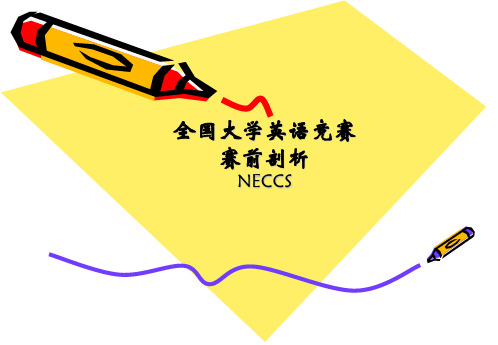
第五部分 翻译 translation
• 5小题,每题2分,共计10分,建议5分钟左右。 • 考核形式:汉译英,英译汉
第六部分 改错 Error correction
• 10小题,每题1分,共10分,建议10分钟左右 • 考核要求:要求学生能用语法、修辞、结构等 语言知识识别短文的语病并改正。
第七部分 智力测试 IQ Test
备战建议
提高阅读理解能力,首先应该树立、培养 良好的默读习惯,克服、减少现有的各种不良 阅读习惯,以提升阅读速度和效率。常见的不 良阅读习惯包括逐字阅读、出声阅读、唇读、 喉读、心读、指字阅读、摆头、回读等。
备战建议
提高英语阅读能力需要具备以下素质 1 2 3
备战建议
众所周知,扎实的语法和丰富的词汇是提 高阅读速度和理解能力的基础和必备条件,广 阔的文化背景知识是促进理解内容的重要因素。 掌握不同的阅读技巧会使阅读过程得心应手, 提高解题速度和正确率。
全国大学英语竞赛 赛前剖析
NECCS
一、全国大学生英语竞赛简介
全称:National English Contest for College Students 简称:NECCS 主办:高等学校大学外语教学指导委员会 高等学校大学外语教学研究会 官网:
性质:全国唯一的大学生英语综合能力竞赛 活动
竞赛进程
初赛 满分150分 (笔试) 决赛 满分150分
(笔试、口试)
全国总决赛 满分200分
(笔试、口试 )
奖励等级: • 本次竞赛四个类别均设四个国家奖励等级:特 等奖、一等奖、二等奖和三等奖。二等奖和三 等奖通过初赛产生。特等奖和一等奖通过决赛 产生,由省(自治区、直辖市)竞赛组织机构根 据决赛成绩确定。
全国大学生英语竞赛备考指南pdf
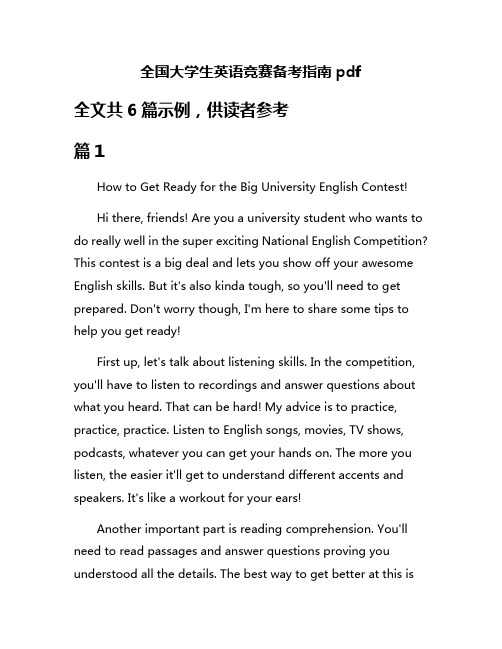
全国大学生英语竞赛备考指南pdf全文共6篇示例,供读者参考篇1How to Get Ready for the Big University English Contest!Hi there, friends! Are you a university student who wants to do really well in the super exciting National English Competition? This contest is a big deal and lets you show off your awesome English skills. But it's also kinda tough, so you'll need to get prepared. Don't worry though, I'm here to share some tips to help you get ready!First up, let's talk about listening skills. In the competition, you'll have to listen to recordings and answer questions about what you heard. That can be hard! My advice is to practice, practice, practice. Listen to English songs, movies, TV shows, podcasts, whatever you can get your hands on. The more you listen, the easier it'll get to understand different accents and speakers. It's like a workout for your ears!Another important part is reading comprehension. You'll need to read passages and answer questions proving you understood all the details. The best way to get better at this isby...you guessed it...reading a ton in English! Read books, magazines, websites, anything that interests you. It'll build your vocabulary and help you get used to different writing styles. Make it fun by picking topics you think are cool.Now let's move on to writing, which is probably one of the trickier parts. You might have to write essays, articles, stories or other pieces in English. The key things to focus on are grammar, spelling, vocabulary, and organization. Read good writing examples to see how it's properly done. And just keep on practicing writing as much as you can - that's how you'll improve!Don't forget about speaking ability too. The competition may have sections where you have to talk or have conversations in English. My advice is to find opportunities to speak English with others as much as possible. If you can make some English-speaking friends, even better! Practicing out loud will make you more comfortable and confident when it's time to talk in the competition.In addition to studying those key skills, it's also smart to look over previous years' competition materials if you can find them. That'll give you a better idea of what types of questions andtasks to expect. Knowing what's coming will help calm those pre-competition jitters!One more really important piece of advice - make sure you take breaks! Studying too much without any rest can just make your brain feel fried. Step away from the books and giving your mind a chance to recharge every so often. Go outside and play, spend time with friends, or just do something you enjoy. Keeping your spirit happy will help keep you motivated.The last thing I'll mention is to believe in yourself! The National English Competition is challenging, but you've got this. If you prepare by practicing those key skills, you'll be giving yourself the best shot at performing well. Don't get discouraged, and remember that making mistakes is okay - that's how we learn and improve.I hope these tips have been helpful for you! Competing can definitely be nerve-wracking, but if you work hard and stay positive, you'll feel ready to show off your fantastic English abilities. Remember to have fun with it too! The competition is a great opportunity to celebrate how far you've come with learning this super cool language.You've got this, friends! Put in the preparation, and you'll feel confident on competition day. Wow the judges with your mad English skills! I'll be cheering you on every step of the way.篇2Getting Ready for the Big English Contest!Hi there! My name is Lily and I'm going to tell you all about how to get super ready for the National English Competition for College Students. This is a really important contest that lets you show off your awesome English skills. Are you excited? I sure am!First up, let's talk about the different parts of the contest. There are four sections: listening, reading, writing, and translation. The listening part means you'll hear some English and have to answer questions about what you heard. For the reading section, you'll read some passages and answer comprehension questions. The writing tests how well you can put your thoughts into words on paper. And for translation, you'll need to translate between English and Chinese. Phew, that's a lot!Now let's go through some tips for each part so you can crush this contest!Listening MasteryThe listening is definitely one of the toughest parts. Here are my best tricks for this section:Watch movies and TV shows in English! This helps train your ear to different accents and speaking styles. Kids shows are great for starting out.Listen to English songs and podcasts too. Singing along is fun practice.Don't panic if you miss something at first. Keep listening and the meaning may become clear.Take good notes as you listen during practice. Jot down key details.Learn common reductions and contractions like "gonna" for "going to". Spoken English is different than written!Reading RockstarFor the reading comprehension questions, you've got to be a book monster! My tips:Read, read, read all the books and stories you can get your hands on in English. Novels, newspapers, magazines – anything!Look up words you don't know and make flashcards to study them.When practicing, skim through the passage first to get the main idea before going into detail.For comprehension questions, go back to the passage and find the evidence for your answers.Don't get stuck on grammar questions. They matter less than understanding the meaning.The Writing WhizShowing your writing skills is so important. Follow these ideas to wow the judges:Practice writing on a variety of topics so you're prepared for anything!Make sure to plan out your essay before writing. An outline helps organize your thoughts.Use lots of examples, details, and reasons to fully support your main ideas.Vary your vocabulary and sentence structures. Boring repetition is a no-no.Leave time at the end to proofread and fix any mistakes!Translation SuperstarLast but not least, the translation section. Here's how to shine:Study the differences between English and Chinese grammar, word order, and phrases.Make flashcards for vocabulary words that are hard to translate directly.When translating to English, think about how a native would naturally say it.Read your translations out loud to catch any awkward phrasing.Practice, practice, practice with all sorts of sample texts until translation becomes second nature.Those are my best tips for conquering each part of the big English competition! The most important thing is to keep working hard, believe in yourself, and don't get discouraged. English is super fun and rewarding when you stick with it.You've got this! Let me know if you need any other advice. I'll be cheering you on!篇3How to Get Ready for the Big English Contest!Hi there, friends! Are you excited about the National English Competition for College Students coming up? I know I am! It's going to be so much fun to test our English skills against students from all across the country. But it's also kind of scary, right? There's a lot to prepare for and practice. That's why I've put together this handy guide to help you get ready. Just follow along and you'll be an English pro in no time!First things first - let's talk about listening comprehension. That's always a big part of any English test. You'll probably have to listen to some recordings or watch some videos and then answer questions about what you heard. Doesn't sound too hard, but it can actually be really tricky!My number one tip is to practice, practice, practice your listening skills. Watch movies and shows in English. Listen to English songs and podcasts. The more you train your ears, the easier it will be to understand when test day comes. You can even find listening practice materials online or get some from your English teacher.When you're practicing, make sure to pay close attention to things like vocabulary, idioms, and different accents. See if you can pick out the key details. Taking notes can also be super helpful for remembering the important points. Oh, and don't get discouraged if you don't understand everything at first. Even native English speakers have trouble sometimes. Just keep at it!Reading comprehension is another biggie for this competition. You'll likely have to read some passages and then answer questions about the main ideas, details, vocabulary, and more. I have a few tricks up my sleeve for conquering those reading sections:First off, don't try to understand every single word when you're reading. That's a rookie mistake! Instead, focus on the overall meaning and context clues to figure out what's going on. Scan for key information like names, dates, and topic sentences.It also really helps to start practicing with short, simple texts and work your way up to longer, more complex stuff over time. Read, read, read anything you can find - books, newspapers, magazines, websites. Mix it up to get experience with different styles and subject matter.And here's a pro tip - take a look at the questions first before you read the passage. That way you'll know what kinds of details and information to watch out for.Let's not forget about the writing section! You'll probably have to do things like write an essay, a story, a report, or even a poem or script. No biggie if you follow my tried-and-true methods:Always, always, ALWAYS plan out what you're going to write before you start. Make an outline or some notes about your main ideas, supporting details, and examples. A strong structure is key for any good writing.Next up, learn those transition words and phrases like "furthermore," "in addition," "however." They'll help your writing flow smoothly from one idea to the next. Using fancier vocabulary is great too, but only if you're sure you're using the words correctly.Pay close attention to grammar, spelling, and punctuation as well. Silly little mistakes can really add up and cost you points. If you have time at the end, be sure to proofread your work.Oh, and one more writing tip - make sure to leave enough time! Don't write a teeny tiny paragraph when you're supposedto be writing a whole essay. But also don't go on and on forever when you should be wrapping things up.Can't forget about speaking for this competition either! There could be sections where you have to answer questions, give a presentation, tell a story, or have a conversation. No need to stress about this though - just think of all the awesome practice you get by, well, speaking English every day!To really nail the speaking sections, focus on things like pronunciation, fluency, vocabulary, and grammar. Listen to plenty of audio examples to help train your mouth muscles and get used to the rhythm and sounds of English. Practice answering sample questions out loud too. You can even record yourself and listen back to catch any mistakes.Don't be afraid to speak slowly and clearly when it counts. It's way better than rushing and stumbling over your words. Oh, and gestures and body language can go a long way too. A friendly smile and some confident hand motions willScore you major points with any judges.Last but not least, there could be a section all about English grammar, vocabulary, idioms, and such. The best way to study for that is by making flashcards, doing practice exercises, takingquizzes, and playing games. Get those grammar rules and word definitions locked into your brain!Most importantly though, the key to success is not stressing out too much! You've been studying English for years, so you've totally got this. Just practice smart, get plenty of rest, and don't forget to have fun with the whole process.I just know you're all going to do amazing at the National English Competition. Hard work, dedication, and a positive attitude are half the battle. Now get out there and show 'em what you can do!That's all from me, friends. Best of luck, and happy studying! Let me know if you need any other tips and tricks.篇4How to Get Ready for the Big English Contest!Hi friends! Are you a college student who wants to do well in the National English Competition? That's a super important test that lets you show off your amazing English skills. My big sister is getting ready for it, and she's been working really hard. I've been watching her and I think I can share some good tips to help you get prepared too!First up, you've got to read, read, read in English as much as you can! My sister is always carrying around novels, newspapers, and magazines from the US and UK. She says reading lots of different things helps her learn new vocabulary words and get used to different writing styles. Whenever she comes across a word she doesn't know, she writes it down to study later.Reading is also great practice for the reading comprehension section of the test. There will be long passages and you'll have to answer questions about the main ideas, details, and vocabulary. My sister warns that the passages can be pretty tricky, so it's important to practice reading carefully and figuring out what the authors really mean.For the listening part of the test, my sister does special listening exercises every day. She finds audio clips or videos in English from news, lectures, movies, and more. Then she has to answer comprehension questions or summarize what she heard. It's just like the real test! Her listening skills are getting so good that she barely needs the Chinese subtitles anymore when we watch Disney movies.The speaking section is another biggie on the test. You'll have to respond to questions and give speeches all in perfect English. No pressure, right? My sister set up a video camera andpractices giving presentations and having conversations. Then she watches the videos to see how she can improve her pronunciation, fluency, and vocabulary usage. Sometimes she even acts out dialogues from movies to work on her speaking!I bet the writing part seems really hard too. You might have to write essays, reports, letters, and more. The graders will be looking for good grammar, a wide range of vocabulary, clear organization, and logical reasoning. My sister is always outlining and drafting her writing samples. She also has a teacher who gives her feedback and corrections. I'm not allowed to read most of her written work yet because she says there's "advanced content" that I'm too young for. Haha, grown-ups are so silly sometimes!In between all of her reading, listening, speaking, and writing practice, my sister is also studying grammar, vocabulary, idiomatic expressions, and test strategies. She uses textbooks, flashcards, apps, and websites to review the rules of English and learn new words and phrases. The competition has a section that specifically tests your knowledge of grammar and vocabulary too. No matter how much English you already know, there's always more to learn!My sister works incredibly hard, but she also takes breaks and has fun while studying. She watches her favorite English TV shows, listens to English songs, and chats with English-speaking friends online. She says enjoyment helps keep her motivated and prevents burnout from too much studying.On test day, the most important things are to get enough sleep, eat a good breakfast, double-check you have everything you need like pencils and ID, and stay calm and confident. You've prepared so well that you'll do amazing! Wouldn't it be so cool to get a medal or trophy from winning the English competition?Well, those are all my top study tips for now. Let me know if you need any more advice from my big sister, the future champion of English! I'll be cheering you on. Study hard, believe in yourself, and do your best. You've got this!篇5Preparing for the Big English Contest!Hi there friends! Are you getting ready for the super duper important National English Competition for College Students? That's a really long name, isn't it? I'll just call it the Big English Contest for short. My older brother is in college and he's been studying really hard to do well on this huge test. I've beenwatching him prepare and I want to share some tips with you on how to get ready for it, just like a big kid!First off, what even is this Big English Contest? Well, it's a major nationwide test that college students from all across China take to show off their English language skills. Thousands and thousands of students compete to see who is the best at listening, reading, writing, and speaking in English. The top scorers get prizes and can brag that they are true English masters! Pretty cool, right?My brother says preparing for this contest is super important if you want to get a good job after college. A lot of big companies look at your scores to see how well you know English. It's kind of like having a superpower in the real world after you graduate. So you better start getting ready now!The first thing you need to do is read, read, read in English as much as you can! My brother has a gigantic stack of books, newspapers, and magazines piled up next to his desk. Whenever I see him, his nose is buried in one of those books. He says reading all those words is helping his brain get better at understanding written English.But don't just read boring textbooks! That would put anyone to sleep. My brother also reads really cool stuff like Harry Potterbooks, Marvel comic books, and even icky mushy romance novels (I tease him about those!). He told me reading for fun helps make learning English feel like a game instead of just studying.You should also be watching movies, TV shows, YouTube videos, anything you can find that is in English! Listening to native English speakers will help train your ears to catch all the different sounds, words, and phrases. My brother loves watching superhero movies like The Avengers. I keep bugging him to watch more kid shows like Peppa Pig with me so I can practice too!Another big part of getting ready is taking a ton of practice tests. There are books and websites that have old versions of the Big English Contest from previous years. My brother prints those out and does them over and over again, trying to finish in the time limit. It's like playing a video game, except you're leveling up your English skills instead of being a cool fighter or something.You can't just read and listen though, you have to practice writing and speaking too. My brother's teacher makes him write short essays and stories every week. His teacher then marks them up with corrections on his grammar, spelling, and all that wichtigstuff. Writing is hard, but keeping a journal or blog where you write in English can help a lot.For speaking, you need to find chances to actually talk out loud in English as much as possible. My brother has English language meetup groups where he goes and chats with other students who are also prepping. He also keeps trying to speak English with my parents, which is hilarious because they don't understand a word and just stare at him blankly! I tease him that he's basically just talking to himself.The most vital thing though is to believe in yourself and stay positive! My brother says he gets stressed out a lot while studying, but he keeps reminding himself that he's working super hard and that he can do well if he keeps at it. Sometimes I have to give him pep talks to cheer him up when he's feeling down about the test. I tell him I know he's going to kick that Big English Contest's butt because he's the smartest big bro ever!Well, those are my top tips that I've learned from watching my brother get ready. It takes a lot of hard work, but you can do it if you make learning English fun. Imagine how awesome you'll feel if you master a whole new language and impress everyone with your skills! Who knows, maybe you'll even inspire little siblings like me to become English experts too someday.I gotta run for now, but let me know if you need any other advice about this Big English Contest thing. I'll be cheering you on every step of the way! Study hard, practice tons, and you're gonna rock this test for sure. Laters gators!篇6Getting Ready for the Big English Contest!Hi there, friends! Are you a university student getting ready for a big English competition? That's super exciting! Contests can be a little scary, but also really fun. I'm going to share some tips with you to get prepared. Just follow along and you'll be an English contest superstar in no time!First things first - you've got to get your body ready! Contests can be pretty long, so you'll need lots of energy. That means eating good foods like fruits, veggies, proteins, and whole grains. They'll help your brain work its best. And don't forget to drink lots of water too! A hydrated brain is a happy brain.Next up is sleeping well. I know it's tempting to stay up super late studying, but that can make you tired and cranky. Try to get 8-10 hours of sleep each night. That way your brain will be well-rested and ready to work hard during the contest.Okay, now for the studying part! One of the most important things is building up your vocabulary. The more words you know, the easier it will be to understand readings and listen to lectures.A fun way to learn new words is using flashcards or apps with word games. You can practice a little bit every day.Reading, reading, and more reading! The more you read in English, the better you'll get at it. Look for books, newspapers, magazines, or websites on topics that interest you. It'll make reading feel like less of a chore. Reading out loud can also really help with pronunciation and fluency.Don't forget about listening practice too! Watch movies, shows, podcasts, or videos in English. Pay close attention and see if you can understand what's being said. If it's too fast at first, use subtitles or transcripts to help follow along.Writing is super important for contests as well. Keep a journal and write about your day, thoughts, or anything else! Getting that writing practice in will make you a stronger writer. You can also do writing prompts and have a friend or teacher give you feedback.Speaking is probably one of the toughest parts of learning English. But practicing is key! You can record yourself reading out loud and listen back to check your pronunciation. Or find afriend learning English to do conversation practice with. The more you speak, the more comfortable you'll become.Grammar study is no fun, but it has to be done. Learn the different grammar rules and do practice exercises. Look out for grammar points you struggle with the most and spend extra time reviewing those. Having solid grammar skills will level-up your English abilities.Here's a bonus tip - when you're practicing reading, writing, listening, or any other skills, keep track of words, grammar points, or anything else you find challenging. Write those down and periodically review the tricky parts until you've mastered them.As the competition gets closer, make sure to get plenty of mock test practice in. Take full, timed practice tests to get used to the format, time pressure, and different question types. Analyze your mistakes so you can learn from them.On contest day, wake up with plenty of time to get ready without rushing. Eat a healthy breakfast with protein and some natural sugars for brain fuel. Drink water and try to stay relaxed! If you've prepared well, you'll do great.Contests can be stressful, but they're also an amazing chance to show off your hard work. Keep a positive mindset,breathe deeply, and give it your all! Remember, mistakes happen - just do your best.Afterwards, be proud of yourself no matter the outcome! Trying your hardest is the most important thing. If there are areas you struggle。
全国大学生英语竞赛考试题型C类
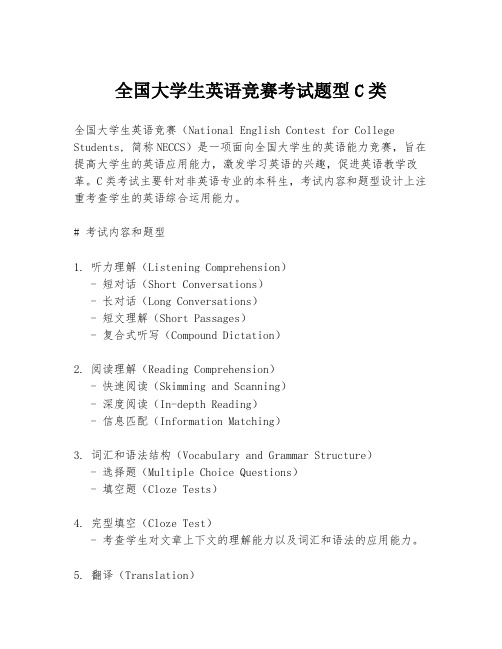
全国大学生英语竞赛考试题型C类全国大学生英语竞赛(National English Contest for College Students, 简称NECCS)是一项面向全国大学生的英语能力竞赛,旨在提高大学生的英语应用能力,激发学习英语的兴趣,促进英语教学改革。
C类考试主要针对非英语专业的本科生,考试内容和题型设计上注重考查学生的英语综合运用能力。
# 考试内容和题型1. 听力理解(Listening Comprehension)- 短对话(Short Conversations)- 长对话(Long Conversations)- 短文理解(Short Passages)- 复合式听写(Compound Dictation)2. 阅读理解(Reading Comprehension)- 快速阅读(Skimming and Scanning)- 深度阅读(In-depth Reading)- 信息匹配(Information Matching)3. 词汇和语法结构(Vocabulary and Grammar Structure)- 选择题(Multiple Choice Questions)- 填空题(Cloze Tests)4. 完型填空(Cloze Test)- 考查学生对文章上下文的理解能力以及词汇和语法的应用能力。
5. 翻译(Translation)- 英译汉(English to Chinese)- 汉译英(Chinese to English)- 考查学生的语言转换能力和对文化差异的理解。
6. 写作(Writing)- 图表作文(Chart-based Writing)- 议论文写作(Argumentative Writing)- 考查学生的写作能力,包括组织结构、逻辑表达和语言运用。
7. 智力测试(Intelligence Test)- 数学逻辑题、图形推理题等,考查学生的逻辑思维和分析能力。
大英赛方法
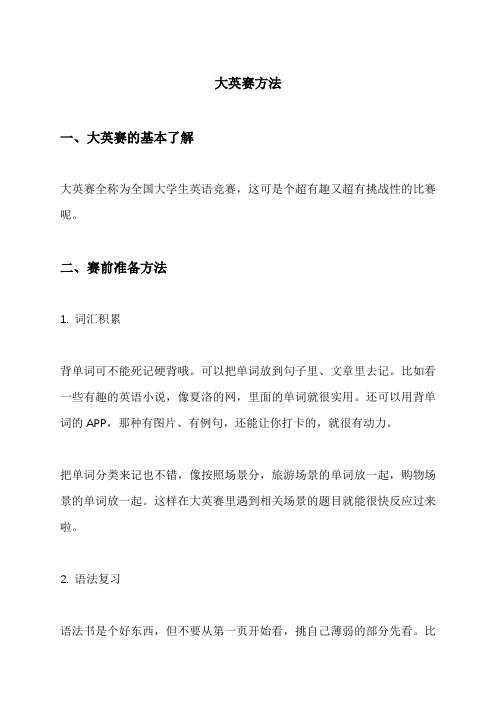
大英赛方法一、大英赛的基本了解大英赛全称为全国大学生英语竞赛,这可是个超有趣又超有挑战性的比赛呢。
二、赛前准备方法1. 词汇积累背单词可不能死记硬背哦。
可以把单词放到句子里、文章里去记。
比如看一些有趣的英语小说,像夏洛的网,里面的单词就很实用。
还可以用背单词的APP,那种有图片、有例句,还能让你打卡的,就很有动力。
把单词分类来记也不错,像按照场景分,旅游场景的单词放一起,购物场景的单词放一起。
这样在大英赛里遇到相关场景的题目就能很快反应过来啦。
2. 语法复习语法书是个好东西,但不要从第一页开始看,挑自己薄弱的部分先看。
比如虚拟语气总是搞不懂,那就专门看这一块。
做一些语法专项练习,做完对答案的时候,要把错误的原因搞清楚,是时态用错了,还是句式结构不对。
3. 听力训练多听英语广播,像BBC、CNN之类的,一开始可能听不懂很多,但是听多了就会有感觉。
看英语电影和电视剧也是很好的听力训练方法。
可以先从有中英文字幕的开始看,然后慢慢过渡到只看英文字幕,最后无字幕。
而且看的时候可以模仿里面的人物说话,这样还能练口语呢。
4. 阅读提升每天坚持读一些英语文章,可以是新闻报道,也可以是学术论文。
读的时候要学会快速浏览,抓住关键信息,这在大英赛的阅读题里很重要。
做阅读题的时候,做完要分析自己为什么做错,是因为单词不认识,还是理解偏差。
三、比赛时的应对方法1. 单选题先把题目快速看一遍,有些一眼就能看出答案的就先选上。
对于不确定的题目,再仔细分析选项之间的差别。
如果遇到特别难的单词或者语法点,不要纠结太久,先选一个自己觉得最有可能的,然后标记一下,有时间再回来检查。
2. 阅读理解先看题目,带着问题去读文章。
这样能更有针对性地找答案。
在文章中找到答案的地方可以做个标记,方便检查的时候核对。
3. 听力题在听之前,先快速浏览一下题目,预测一下听力内容。
听的时候集中注意力,如果有没听清的,不要慌,接着听后面的,说不定后面会有提示呢。
- 1、下载文档前请自行甄别文档内容的完整性,平台不提供额外的编辑、内容补充、找答案等附加服务。
- 2、"仅部分预览"的文档,不可在线预览部分如存在完整性等问题,可反馈申请退款(可完整预览的文档不适用该条件!)。
- 3、如文档侵犯您的权益,请联系客服反馈,我们会尽快为您处理(人工客服工作时间:9:00-18:30)。
学长分享英语竞赛技巧:知己知彼百战不殆”,要想在全国大学生英语竞赛中取得好成绩,平时的积累是基础,而考前对考试的研究和分析以及练习则是升华。
近几年来英语竞赛也在不断调整中。
对我们来说,最重要的参考资料就是当年的竞赛样题,和官网的考试说明文件,从中我们可以了解到考试的题型、分值、时间分配、难度和新变化。
只有这样我们才能对症下药,合理分配考试时间,获得最好的成绩。
其实考试,一言以蔽之,就是尽量的规定时间内拿到最高的分数,分数越高,就意味着你越成功。
由于每年试题结构、题型等都会有所变化,下面就以2010年的英语竞赛初赛试题为例,分析一下时间安排。
今年初赛试题共分为七部分,时间120分钟,满分150分。
七部分分别为听力、词汇与语法结构、完形填空、阅读理解、翻译、智力测试和写作。
下面就分别进行分析。
第一部分是听力,由四部分组成,第一部分是五篇短对话,然后是两篇长对话,第三部分是五篇短新闻,第四部分是听写式填空。
总分是30分,总的来说,听力的难度不算很大,应该是介于四、六级之间,大部分都可以直接从对话中找到原句和答案。
但是还是有一定难度的。
首先,前20道选择题都只读一遍,这和一般的考试不同,所以对选手就提出了更高的要求,必须从一开始就高度集中注意力,才能不遗漏重要信息。
此外,听写式填空也是对基本知识的一个考查,经常有同学听到了却不会写,这需要我们打好自己的基础。
这一部分要力争拿到20分以上。
第二部分是词汇与语法结构,这也是对“双基”知识的一个考查,可以说基本上是考查基本功的,当然我们也要注意,这其中对话类的应用题目也呈逐年上升的趋势。
总分15分,官方建议完成时间是十分钟。
这一部分要力争拿到10分以上。
第三部分是完形填空,也是我认为全卷除了智力测试以外最难的题目,题型包括根据上下文填空、根据给出的首字母填空、根据给出的单词的适当形式填空。
分值是十分,官方建议完成时间是10分钟。
这题不仅考查你的基本词汇语法知识,也考查你对文章的理解和把握。
可以说是阅读+词汇的结合。
要拿高分很难,但是其实还是有一些分好拿的,这一部分我们要力争拿到4分以上。
第四部分是阅读理解,总分40分,官方建议完成时间是25分钟。
这是全卷分值最大的一道大题,也是时间最紧的。
我估计绝大多数同学在25分钟内都没办法全部完成(我也很勉强)。
这一部分我觉得最重要的还是把握文章的开头和结尾,了解主旨,然后根据题目去快速定位,因为这里的题目大部分都是在原文可以找到答案的。
这一部分阅读量大、题型多样(包括选择题、问答题、是/否/未提及题,摘抄题、填空题等)、也是对同学英语应用能力的有力考查,还是要熟能生巧,在平时多加练习,力争达到又对又快的境界,这一部分要力争拿到25分以上。
第五部分是翻译,包括英译汉和汉译英两部分。
共20分,官方建议完成时间是15分钟。
这一部分可以说是全卷最简单的题型,考查的内容都没超过四级甚至是平常练习的难度,对英译汉,还是要花点时间看看文章开头和结尾,“磨刀不误砍柴工”,很多翻译都要根据上下文进行,才能更加的到位。
有时在翻译中遇到生词,也可以根据上下文进行推断。
比如今年的汉译英试题中多次提到“dropout”这个单词,我考试时也忘了这是什么意思,最后还是通过文章最后一句中的“to complete their educations”猜出是辍学的意思。
至于汉译英就是我们很熟悉的题型了,注意英语表达的形式就问题不大。
第六部分是英语竞赛最有特色的一块,IQ测试,共5分,官方建议完成时间是5分钟。
这道题目我的最大感觉就是鸡肋。
不过还是很多同学还是不舍得这块,浪费太多时间在这上面,导致后面作文写不完,真是得不偿失啊。
关于时间分配和取舍的问题,我后面还会重点强调。
第七部分是写作,很传统的题目,一道应用文,10分,一道议论文,20分,共30分钟。
官方建议完成时间是30分钟。
一般第一篇是要求100词以上,第二篇是120词以上,这样的要求也就差不多是四级的要求,但是还是有很多同学很遗憾地倒在了这上面,我参加过三次竞赛,每次考完都会听到很多同学抱怨:“这次完了,最后一篇作文没写。
”这是非常令人惋惜的。
因为我觉得以我们大家的水平,这两道题拿个20分以上的分数对大多数同学其实问题不大,你少写了一篇20分的作文,就相当于比别人少了十几分,而这要在前面补回来谈何容易,因为每个小题的分值都不过一到两分而已,差十几分可能就相差了两个档次的奖项(在重点大学可能更甚)。
英语竞赛时间分配及应试技巧:上面分享了本人英语学习的一些经验心得和对考试题型、分值,题量等进行了一些说明。
接下来就来说说很多考生关注的时间分配问题。
英语竞赛里面的题目如果单独跳出来的话,很多都不超过四级的难度要求,甚至比我们平时的练习还简单,但是为什么很多同学都不能取得理想的成绩呢?基础是一方面,而时间分配也很关键。
说说我自己的经验,我们学院是9:40-10:05放C类听力,大约考前十分钟开始发放试题册,一般老师都会提前一点时间发试卷,要抓紧这一块时间,可以先做一些词汇题,然后接着做阅读,我的话这次考试时就在听力前把词汇和阅读做好了,刚好达到官方建议时间。
听力的话时间也没办法挤,而且还要填卡,还要多花2-3分钟。
而完形的话,基本上时间也是很紧的,刚够用而已。
所以我是从翻译挤了五分钟来补。
做完翻译直接挑过IQ题,然后按照官方建议时间把作文好好地写完,最后还剩三分钟,结果还研究出了两道IQ题。
我之前两次参赛也基本用这种方式,也都勉强完成了所有题目,结果也都还好。
所以建议各位同学平时一定要做做样题或者真题,而且要严格按照考试的时间要求做,这样才有效果。
如果有些同学觉得自己的速度实在达不到试题的要求的话,我还有一招。
就是听力之前先把作文写好,听力后再把阅读和翻译做好,然后做词汇,最后再做完形和智力题。
因为写作占了30分,听力30分,阅读40分,加上翻译的20分,基本上你的成绩也定型了。
而且这些部分其实难度都不算太高,先把这些题目做好比较值得。
像完形和智力题你可能花了很多时间,最后也拿不到几分,还不如把其他分值大的大题先做好,分值大的题目往往反而不难,很多都是送分题,所以我们要学会取舍,先把大块的分数拿下,有时间再去完善细节。
毕竟,这是竞赛;毕竟,其实90多分就能拿三等奖了(我们学院);在考试时,绝对不能在某些小题上花费太长时间,要先易后难,先把基本分拿到,再去完善细节。
要记得,我难人难,自己不会做的题目往往大多数人也做不出来。
实际上,只要你把握好时间,把自己会做的题目都做好了,我觉得起码拿个三等奖是没问题的。
因为很多人连自己会做的题也因为时间分配不善没拿到(尤其是作文)。
考场细节:接着再谈谈考场上的一些细节问题,不要小看这些细节,“细节决定成败”。
比如考前一定要提前核对自己的考试物品是否准备充分、完好。
不要到时忘了带身份证(准考证)还要到处找老师证明,或者没带铅笔或者耳机去借,这不仅浪费时间,而且会影响我们的心态,不利于我们发挥出水平。
然后对竞赛要以平常心对待,要把这看作一次锻炼、展示自己的机会,不要压力太大,考试时不要有侥幸心理,把注意力放在自己的试卷上。
还有就是要有良好的心态,学会应对一些突发事件。
比如听力录音不清楚的话也不要一味怨天尤人,想想别人也是一样的,尽力去听就好了。
像我去年听力的时候,和我一位同学的听力都在考前几分钟坏了,他没声音,而我居然不小心把天线给折断了。
这时真是“千钧一发”啊。
然而最终我们的结果却是大相径庭,我拿到了二等奖,我同学却榜上无名,这是为什么呢?他发现临时借一个来不及了,想到听力30分没法做了,就觉得考试无望了,结果后面也是乱作一通。
而我却急中生智,用手指捂住天线断口处,坚持听了下去,虽然有一些杂音,不过我后面并没有收到影响,还是正常发挥了自己的水平。
当然这个例子有点极端,但是也从侧面说明了:考场如战场。
不单单是考查对知识的掌握,也是考验一个人的心态、应变能力和抗压能力等。
说了那么多,最后总结一下我心中的大学生英语竞赛的特点:面向绝大多数同学、注重基本知识和应用能力的考查,题量大、阅读量多,题型新颖多变,但是题目本身难度并不是很大。
希望我的一些心得体会能对大家将来参加英语竞赛有所帮助,也希望大家能够通过竞赛来认识更多志同道合的朋友,提高自己的英语能力!简略版本技巧:1.总体看来,这个比赛不仅考程度,而且考速度。
要注意下。
2.听力难度和方式可谓变化多端。
如果听起来很容易,那么题目中肯定有很多陷阱。
反之,譬如说预赛的新闻听力,那些题目往往不会太容易答对。
3.有很多次考试都是把完形填空打散让你选,粗心的考生如果不看题头可能就要中招。
4.阅读量巨大,各种怪模怪样的文章形式都出现过,题目设置从简答到选择不拘一格。
关键还是心态要冷静。
5.改错难度甚大,许多进入决赛的同学都放弃了这个项目以节省时间。
IQ和猜词也是如此。
前者可以乱选一气,后者就要费点脑筋了,但是不要超过题头建议给你的时间。
6.翻译安排得很靠后,但是其简单程度令人咋舌。
因为前面浪费了时间而不得不放弃此项的同学事后无不捶胸顿足。
哎,毕竟交了15块钱参赛费呢!7.作文在预赛中显得很小儿科,但是决赛中就尽显杀手本色,有一年画了个自行车,标了很多零部件的名称,要我们写它怎么环保。
其实绝大部分名称可以不用理睬。
